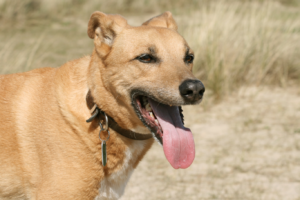
Face it. We’re not getting any younger, and neither are our pooches. In general, dogs reach their senior years around 7 to 10 years. You can estimate how old your furbaby is by multiplying his age by 8 for most pups or 6 for small breeds (under about 10-15 pounds).
Like people, dogs go through changes as they age. Their needs are different.
One example of this is how pups respond to temperature extremes. Their bodies don’t thermoregulate as well. You can protect your special pal in cold weather by limiting their time outside, providing them with warm blankets, or using a dog sweater and booties for outdoor activities. When it’s hot, don’t leave Fido in the yard for long periods of time. Make sure he has easy access to shade and water.
What else can you do to help your pooch age gracefully? Let’s take a look at 10 other ways you can navigate this life stage with your furbaby:
#1 Provide Proper Nutritional Support for Your Dog’s Changing Needs
As pups age, they have different dietary needs. Their metabolism usually slows down, and they may need a lower calorie senior food to help with weight management. Don’t just feed Fido less food if he’s gaining weight. You could be depriving him of important nutrients.
Additionally, older dogs may be more prone to conditions like diabetes, heart disease, and arthritis. Maintaining an optimal body condition helps prevent putting unwanted stress on the joints, heart, and kidneys.
Some seniors also struggle with digestive problems. Consider offering food that’s easy to chew and metabolize. You may need to supplement with fiber if your pal suffers from constipation.
#2 Add Dietary Supplements for Extra Support
Like us, our canine companions may experience degenerative changes as they age. Some seniors struggle with arthritis and stiffness. Supplementing their diet with glucosamine and chondroitin helps support the joints. These nutrients work to protect the cartilage. Two quality supplements that contain glucosamine and chondroitin are Cosequin & Dasuquin.
Other valuable supplements to consider include:
- Fish oil – This ingredient provides omega fatty acids that support healthy cognition, hair, joints, and skin.
- Probiotics – These active cultures aid the digestive process.
Talk with your veterinarian about which supplements are best for your furbaby’s needs.
#3 Keep Providing Mental and Physical Exercise
Even though your four-footed pal may be slowing down, he still needs regular exercise. Gentle movements are good for the joints and the heart, and they help keep the digestive system moving. Plan activities like short walks, a trip to the park, or swimming. Just remember to keep things in moderation to avoid overtaxing the muscles and joints.
In addition to physical exercise, remember to provide your furbaby with plenty of mental stimulation to keep his mind sharp. Pups benefit from interactive games that challenge their gray matter. Invest in food puzzles or play some games of “Hide and Seek” to support Fido’s cognitive function.
#4 Plan Routine Wellness Exams With Your Veterinarian
As the body ages, it’s more vulnerable to a variety of diseases like arthritis, cancer, diabetes, and heart disease. Regular check-ups can help you detect conditions quicker. Routine testing establishes a baseline so that you’re able to identify hidden health threats. That’s why many veterinarians recommend that senior pooches come in for an exam and lab work twice a year.
As part of your wellness exams, your pup’s doctor will provide vaccinations and screening for common parasites. These services are an important part of preventing infectious and parasitic diseases like distemper, rabies, or heartworm.
#5 Provide Therapeutic Support for Your Pal
The degenerative changes that come with age can leave your furry friend feeling stiff and sore. In extreme cases, he may have mobility difficulties. Fortunately, there are a variety of therapy aids available to help your pooch:
- Laser therapy – Many veterinarians offer cold laser treatment to aid in the healing process and to help with pain management.
- Hydrotherapy – Swimming in warm water or working on an underwater treadmill can help keep the muscles moving without stressing the joints.
- Veterinary physical therapy (PT) – Veterinary directed PT focuses on your furbaby’s unique needs to develop a tailored set of rehabilitative exercises.
- Massage – Canine massage therapists can teach you techniques to stimulate blood flow to your pal’s muscles and gently work out any knots.
- Support lift slings – These devices are useful when your four-footed friend has difficulty walking or rising from a prone position.
- Dog back brace – If your pup suffers from or is at risk for intervertebral disc disease, a back brace provides the support and protection he needs.
#6 Practice Good Oral Hygiene
Dogs may not be as likely to get cavities, but they can suffer from tartar build-up. These accumulations contribute to gum disease and bacterial infections. That’s why it’s important to take good care of Fido’s chompers.
Your veterinarian can teach you how to brush your pal’s teeth and recommend safe oral hygiene products. Another way to support your dog’s dental health is by scheduling regular professional cleanings to clear away tartar plaques.
#7 Make Accommodations to Fit Your Senior Dog’s Needs
If your canine companion has mobility issues, there are things you can do to “Seniorize” your home:
- Build a doggie ramp for the stairs or to get into bed
- Consider a portable ramp for the car
- Install a doggie door to give your pooch easy access when he needs to go outside
- Invest in a thick orthopedic dog bed to provide comfort and joint support
- Use skid-resistant rugs for better footing on slippery floors
#8 Provide Meds for Arthritis Pain Relief
Many older dogs experience arthritis. In addition to the supportive care we already mentioned, talk to your veterinarian about prescription medications. Some effective treatments include:
- Adequan injections to joints and stimulate new cartilage growth
- Anti-inflammatories or Rimadyl or steroids
- Pain relievers like Tramadol
One note: these medications can have side effects. Work with your pal’s doctor to choose the right combination, dosage, monitoring plan.
#9 Plan Regular Grooming Sessions
Regular grooming is essential, particularly if you have a long-haired dog. Brush the coat frequently to prevent matting. Make sure you keep the potty area well-trimmed and check it daily for fecal balls or irritation. The grooming sessions also allow you to trim the nails and check your pal for lumps and bumps. The sooner you identify new growths, the more likely that treatment will be successful.
#10 Give Your Pal Lots of TLC and Attention
Over the years, our pooches develop a special bond with us. It’s important to give them time and attention in their senior years. They crave TLC and companionship. Your presence and cuddles will provide your senior pal with the stability and comfort he needs.
As Fido ages, these are some actions you can take to make him more comfortable. The support and care you give your special pal in his golden years help to keep him happy and healthy.
Bio: Scarlett Gold is the head of content at FluentWoof.com. She is a Yorkie-Mixed mom and a true animal lover. Her primary focus is bringing readers the very best dog care resources and info to help owners better care for their canine companions.


